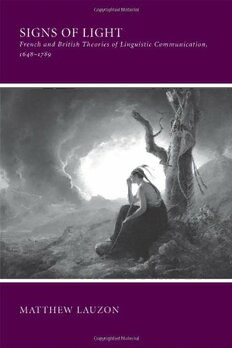
Signs of light: French and British theories of linguistic communication, 1648-1789 PDF
269 Pages·2010·0.774 MB·English
Most books are stored in the elastic cloud where traffic is expensive. For this reason, we have a limit on daily download.
Preview Signs of light: French and British theories of linguistic communication, 1648-1789
Description:
In Signs of Light, Matthew Lauzon traces the development of very different French and British ideas about language over the course of the late seventeenth and eighteenth centuries and demonstrates how important these ideas were to emerging notions of national character. Drawing examples from a variety of French and English language works in a wide range of areas, including language theory, philosophy, rhetoric, psychology, missionary tracts, and literary texts, Lauzon explores how French and British thinkers of the day developed arguments that certain kinds of languages are superior to others.The nature of animal language and British and French understandings of the languages of North American Indians were vigorously debated. Theories of animal language juxtaposed the apparent virtues of transparency and wit; considerations of savage language resulted in eloquence being regarded as an even higher accomplishment. Eventually, the French language came to be prized for its wit and sociability and English for its simple clarity and vigor. Lauzon shows that, besides concerns about establishing the clarity of introspective representations, questions about the energetic communication of sincere emotion and about the sociable communication of wit were crucial to language theories during this period. A richly interdisciplinary work, Signs of Light is a compelling account of a formative period in language theory.
See more
The list of books you might like
Most books are stored in the elastic cloud where traffic is expensive. For this reason, we have a limit on daily download.
